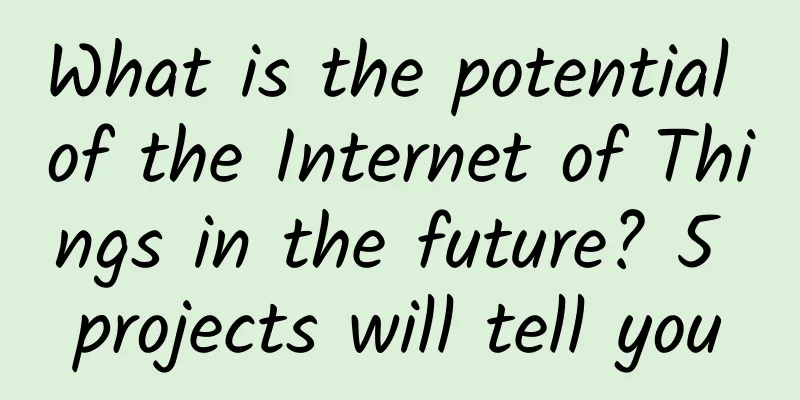In the 5G era, what is the United States worried about?

|
Today I want to talk to you about a technical topic, which is the video below. This was a press conference held at the White House in April this year. The core point was just one sentence: the 5G competition has begun and "the United States must win this battle." Sure enough, one month later, the US government's 5G strategic layout has begun to be implemented. At the same time, it continues to suppress its Chinese competitor, 5G leader Huawei, by all means. There have been a lot of discussions about Huawei in the past few days. However, there is still an interesting question in this video: Why is 5G so important that the U.S. government believes it must win and not let any other country get ahead of it? subversion 5G is more than just an extra G compared to 4G. 5G is much more complex than 4G in terms of network architecture. Compared with 4G, 5G has the characteristics of ultra-high network speed, ultra-low latency, and ultra-wide connection. It can be said that 5G is revolutionary. If you are a TV drama fanatic, then congratulations, it takes about 6 minutes to download a 2-hour movie through the existing 4G network, but through the 5G network - it only takes 3.6 seconds. What supports the increase in download speed? It is the leap in 5G speed. At the peak, it can reach 100 times that of 4G network and reach a peak speed of 10Gb/s. Fast Internet speed is certainly not the reason why the United States attaches so much importance to 5G, and even does not hesitate to "kidnap" corporate executives and use state power to suppress a Chinese company. Even if there are many fanatical movie fans among American officials, they cannot do this. But if Uncle Dao tells you that 5G can drive the development of many emerging industries, create trillions of economic benefits and tens of millions of jobs, things will seem different. The network latency of 5G can be as low as 1 millisecond, which is much higher than the human body's stress response (such as automatic braking that is faster than human reaction, reducing the dizziness caused by current VR). Therefore, it can be widely used in the field of automatic control, such as unmanned driving, industrial control, remote operation and maintenance, and remote surgery. 5G has the ability to support over 100 billion connections and can also ensure low power consumption and low cost of terminals. Smart homes, the Internet of Things, smart cities, smart transportation, and environmental monitoring are all its application scenarios. According to Qualcomm's survey data, by 2035, industries that use 5G to improve productivity are expected to create $12 trillion in output value worldwide, and 22 million jobs will be created directly or indirectly. If you feel that this set of data is meaningless, then we can compare it with China and the United States, and it will be clearer. On April 12, the White House stated that the US 5G network construction plan will invest $275 billion, which will increase US GDP by $500 billion and create 3 million jobs; A report from the China Academy of Information and Communications Technology shows that China's 5G commercialization may explode between 2020 and 2025, achieving a direct increase of 10.6 trillion yuan in total economic output and an indirect increase of 24.8 trillion yuan, directly creating more than 3 million jobs. These are all money and political achievements. Can the American political and business circles give them up? In fact, according to a report by Kearney, the five core technologies of future manufacturing - artificial intelligence, the Internet of Things, advanced robotics, 3D printing and VR/AR (augmented reality and virtual reality) - are all transformative and disruptive, and when they work together, they will completely overturn traditional business models, communication methods and even the global economic structure. All of these rely on the underlying technology of 5G.
3D Printing Human Face Scramble 5G has become a new "space race" between countries, and it is indeed a must-win for all. Qualcomm's CEO even compared it to the historical electricity revolution. However, at present, there are only two real leaders in the 5G race - China and the United States. The "5G Global Competition" report of the U.S. Wireless Communications and Internet Association stated that if the private enterprises' 5G experiments and introduction progress, radio wave allocation, government strategy, etc. are included in the scoring assessment, based on the situation in 2019, China and the United States are tied for first place. Even if it is true as the US report says that China and the United States are evenly matched, this is definitely not the result that the US government wants. What's more, judging from the current "frustrated" performance of American politicians, China's overall strength should be slightly better. When Ren Zhengfei was interviewed by reporters, he made it clear that in terms of 5G technology, even with the current suppression by the United States, Huawei's technology is still 2-3 years ahead of the world. In fact, looking at the domestic United States, they also have a 5G terminal solution provider (Qualcomm), but no 5G telecommunications equipment manufacturer - this is a bit embarrassing. You should know that there are currently four dominant 5G telecommunications equipment manufacturers in the world: Huawei, Ericsson, Nokia, and ZTE. There are two in Europe, two in China, and Samsung is ranked fifth. There is no American one. As for the number of 5G patents, as of May this year, China accounted for 34% of the global applications for 5G communication system standard essential patents. The following figure shows it very clearly. Among them, Huawei's number of patent applications ranks first in the world, while Qualcomm and Intel of the United States rank sixth and eighth respectively. But in the competition in the 5G field, the U.S. government's advantage lies in chips. There is a huge family of chips. Whether it is a server, base station or mobile phone, different types of chips are needed, such as computing chips, storage chips, control chips, baseband chips, dedicated chips, sensor chips, etc. At present, the world's major chip companies include Intel, Qualcomm, Huawei, Samsung, Unisoc and MediaTek. In the field of 5G chips, the United States still has a greater advantage overall, and China is stepping up its efforts to catch up. plan In order to catch up with China's pace in 5G network construction, the United States has formulated many plans - yes, the state-made industrial plans that they have always opposed. In March this year, some officials proposed nationalizing the US 5G network, with the US government funding the construction of a single high-speed mobile communications network and then leasing access points to operators such as AT&T, Verizon and T-Mobile, which attracted a lot of opposition; In April, the US government confirmed that it would auction more 5G spectrum, simplify the 5G approval process, encourage private companies to launch 5G networks in 92 cities this year, and set up a $20.4 billion rural digital opportunity fund - which was equivalent to announcing the abandonment of the 5G nationalization plan; On May 20, the Federal Communications Commission approved the merger of T-Mobile and Sprint, the third and fourth largest telecom operators in the United States, on the condition that the new company would build a 5G network covering 99% of the American population in the next six years. In the next three years, the network will cover 85% of the rural population in the United States, and reach 90% within six years. The government has already set KPI indicators for the new company before it is established. We are confused about what the relationship between the government and businesses is in the United States.
The merger of T-Mobile and Sprint will create the second largest telecommunications company in the United States after AT&T Safety Of course, the reason for suppressing China's 5G cannot be simply "we can't let the Chinese make all the money", which sounds unconvincing. Therefore, the reason of "national security" can certainly come in handy. In April this year, the US Department of Defense released a report saying: “The biggest application potential of 5G lies in its potential impact on future warfare or military networks. When the Department of Defense operates overseas in the future, the vast majority of networks and systems may rely on 5G infrastructure. If China takes the lead in 5G infrastructure and systems, the DoD’s future 5G ecosystem could potentially have Chinese components embedded in it. This would pose a serious threat to the security of DoD operations and networks.” Everyone still remembers US Secretary of State Pompeo’s "anti-Huawei" global tour since this year. No matter which country he visited, he never forgot to ask the local government not to use Huawei equipment. In fact, this is nothing new. In recent years, the United States has been promoting Ren Zhengfei’s former military identity, claiming that the Chinese government and Huawei have a "special relationship" and that Huawei will install "backdoors" at the request of the Chinese government. One netizen used a joke to vividly describe the image of the United States biting back at Huawei for its own misconduct: United States: You can't buy Huawei 5G equipment, they are definitely spying on you. Europe: How do you know we want to buy Huawei equipment? United States: What Merkel said on the phone... Europe:...... However, despite accusing Huawei of being insecure, the US government has never had any evidence. In fact, I mentioned in an article last August that 5G introduces stronger encryption algorithms, privacy protection and authentication mechanisms, so it is more secure than 4G. It has an important feature: its radio access network is not aware of the service, does not involve DPI, and does not touch the pipeline data. It is like a "porter" with his eyes covered, and has no idea what is in the box he is moving. In this way, no matter which country provides 5G services, it is just a pipeline without snooping capabilities, which only transmits information as it is. Xiang Zhuang dances with a sword, aiming at Pei Gong. Navarro, a well-known hawk, author of "Letter to the United States" and director of the White House Trade Council, was even more blunt. He said, "In my opinion, China's shameless announcement of the 'Made in China 2025' plan is tantamount to telling the world: 'In the future, we will dominate any emerging industry, so your economy will no longer have a future.'" It's 2020 now. Faced with international economic and technological competition, there are still some people whose minds are stuck in the Cold War zero-sum game thinking framework, which is really regrettable. Even China, which is leading in 5G technology, has never closed itself off. For example, Nokia and Ericsson are both involved in China's 5G projects. In April last year, Nokia won a large contract for China's 5G mobile network construction and will jointly build 13 urban subway networks and 2 provincial backbone networks with China Mobile.
The 5G base station demonstrated by Huawei is half the size of the 4G base station. However, there are still some politicians and media in the United States who confidently accuse Huawei of stealing American technology. Ren Zhengfei responded well: "What Huawei is doing now has not been made in the United States, so where can I go to steal their technology?" |
<<: Hot Topic | Why is the United States determined to "kill" Huawei?
Recommend
Virtono: $2.5/month KVM-1GB/30GB/2TB/16 data centers in Hong Kong, Japan, Singapore, etc.
Virtono is a foreign VPS hosting company founded ...
NFV/SDN is a must for 5G, not an option
The arrival of 5G is not only an evolution of net...
Is 5G cooperation the starting point for operators’ value return?
After the 5G licenses were issued, the market gen...
New optical spiral technology can increase information transmission rate tenfold
A new optical-based communications tool can trans...
RAKsmart: US servers start at $46/month, Hong Kong/Korea E5 servers start at $99/month, cluster servers 258IP monthly payment starts at $153
Earlier this month, we shared RAKsmart's VPS ...
After three whole years, what changes has 5G brought us?
On June 6, 2019, my country officially issued 5G ...
[11.11] Maxthon consoles are 32% off, top up 611 yuan and get 111 yuan for free
Aoyo Host (aoyozhuji/aoyoyun) has launched this y...
Huawei launches OceanStor Dorado V6, a new generation of intelligent storage, explaining how data creates value
[51CTO.com original article] Huawei recently rele...
TmhHost: Los Angeles CN2 GIA quarterly payment starts from 100 yuan, US CN2 GIA line 200Gbps high-defense VPS 20% off
TmhHost has launched its latest promotion, involv...
How do cellular networks serve the Internet of Things?
Cellular networks provide the backbone for many o...
What is Wi-Fi 6, and how does it help expand broadband access?
The coronavirus pandemic has exacerbated the digi...
Netty - Sticky Packets and Half Packets (Part 2)
Continue from the previous article "Introduc...
From fiber to 5G: A comparison of internet connection types
Connecting to the internet has never been easier:...
Casbay: Malaysia VPS monthly payment starts from $9.59, Linux/Windows optional, 100M unlimited traffic
Last month, I shared information about Casbay and...
How to improve the operational capabilities of data centers?
Data center operation is an important part of an ...









